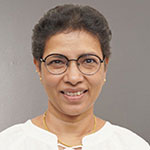Voices from Asia: Havilah Dharamraj

I wasn’t always a theologian. I came to theology rather late, in my mid-thirties. And this after having taught a decade of Chemistry—heh!—in high school. The motivation for this discipline shift came from an early admiration for the Old Testament, going back to my pre-teen years. English Literature was my favorite subject in school, and the OT’s appeal ran alongside that of the sizeable stacks of fiction I borrowed weekly from the school library.
How can theologians help the church in Asia? I pass the question through my reading habit as a schoolgirl and my areas of research interests as an academician and arrive at two answers.
First, the academy can help the church in Asia retrieve the lost art of storytelling.
Biblical narrative is the stretch from Genesis to Esther, and from Matthew to Acts, covering some 40 percent of the Old Testament and 60 percent of the New Testament. That makes stories the major literary genre of the Bible’s 66 books. How ironic that this genre is largely reserved for Sunday School! Even if used at the pulpit, these texts are not usually “told” as a story. “Telling” would mean carefully tracking the narrative unit toward the point where the narrator is driving the story. That point is clearly made in the parables but is not as obvious in Old Testament stories.
In such cases, the preacher simply grabs at whatever jumps out at them, hijacking the endpoint of the narrator. For example, the point of Jacob’s wrestling bout with God is not, “hang on to God till you wrestle a blessing out of him” (Gen 32:22-32). That sorry takeaway comes from not paying attention to how the story is told; from wrenching the episode out of the ongoing Jacob narrative and treating it as a standalone; from not bothering to read up on the long ago and far away world in which the story is set. Unable—or unwilling—to do the required homework, the average Sunday sermon violently extracts from the narrative anything from one to ten (alliterating!) points.
What the academy can offer the church is a toolkit for careful biblical interpretation that unleashes the power of the Bible’s narratives. It is a literary form and sermonic style native to us Asians. When we wish to make a point, we tell a story—much like Jesus—an Asian himself—did. And that is why we draw upon our heritage of folk tales and fables in daily conversations. That is why itinerant storytellers make the rounds of our small towns and villages. Indeed, that is why we keep plumping up our standard three-point sermons with illustrations. Asians would do themselves a favor by retrieving the art of storytelling in the pulpit, preaching biblical narrative in a manner faithful to its narrator’s intention.
Second, the academy can help the church in Asia gainfully read sacred literature of other faiths.
I learned this early. In Scripture lessons in my Church of England missionary all-girls school, we learned the Bible. During library hours I read, among others, stories from the Ramayana and the Mahabharata, the epic poems of Hinduism. Reading these as a Christian, I realized retrospectively that I was conducting an intuitive exercise in comparative literature.
For conservative Asian Christians, the sacred books of the East—or, for that matter, any devotional literature by a non-Christian—have neither place nor purpose. However, Asians could profit by learning how to read the Bible in conversation with the sacred literature of their regions. These readings need to be sympathetic rather than adversarial, as in previous generations, yet without compromising the orthodoxy of our faith and practice.
Take, for example, this achingly exquisite poem by India’s Nobel laureate Rabindranath Tagore (1861-1941) and imagine reading it alongside an excerpt from the familiar Ps 90:2-10:
Time is endless in thy hands, my lord.
There is none to count thy minutes.
Days and nights pass and ages bloom and fade like flowers.
Thou knowest how to wait.
Thy centuries follow each other perfecting a small wild flower.
We have no time to lose,
and having no time we must scramble for a chance.
We are too poor to be late.
And thus it is that time goes by
while I give it to every querulous man who claims it,
and thine altar is empty of all offerings to the last.
At the end of the day I hasten in fear lest thy gate be shut;
but I find that yet there is time.Before the mountains were born
or you brought forth the whole world,
from everlasting to everlasting you are God…
A thousand years in your sight
are like a day that has just gone by,
or like a watch in the night…
Our days may come to seventy years,
or eighty, if our strength endures;
yet the best of them are but trouble and sorrow,
for they quickly pass, and we fly away.
I can see a fruitful comparative reading happening with a group of seekers or a Christian study group keen on literature appreciation. As we put the Bible into conversation with these expressions of human longing for understanding, we do so with the conviction that the Bible is uniquely privileged. It is God-breathed, infallible, and eminently incomparable. However, reading these luminous, living words alongside those outside the Christian circle can layer and nuance our (perhaps tired-ly traditional) reading of the Bible. We might understand our God, ourselves, and the world, in ways that are more intimate, more urgent, and more present.

